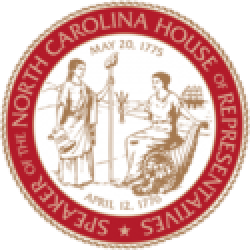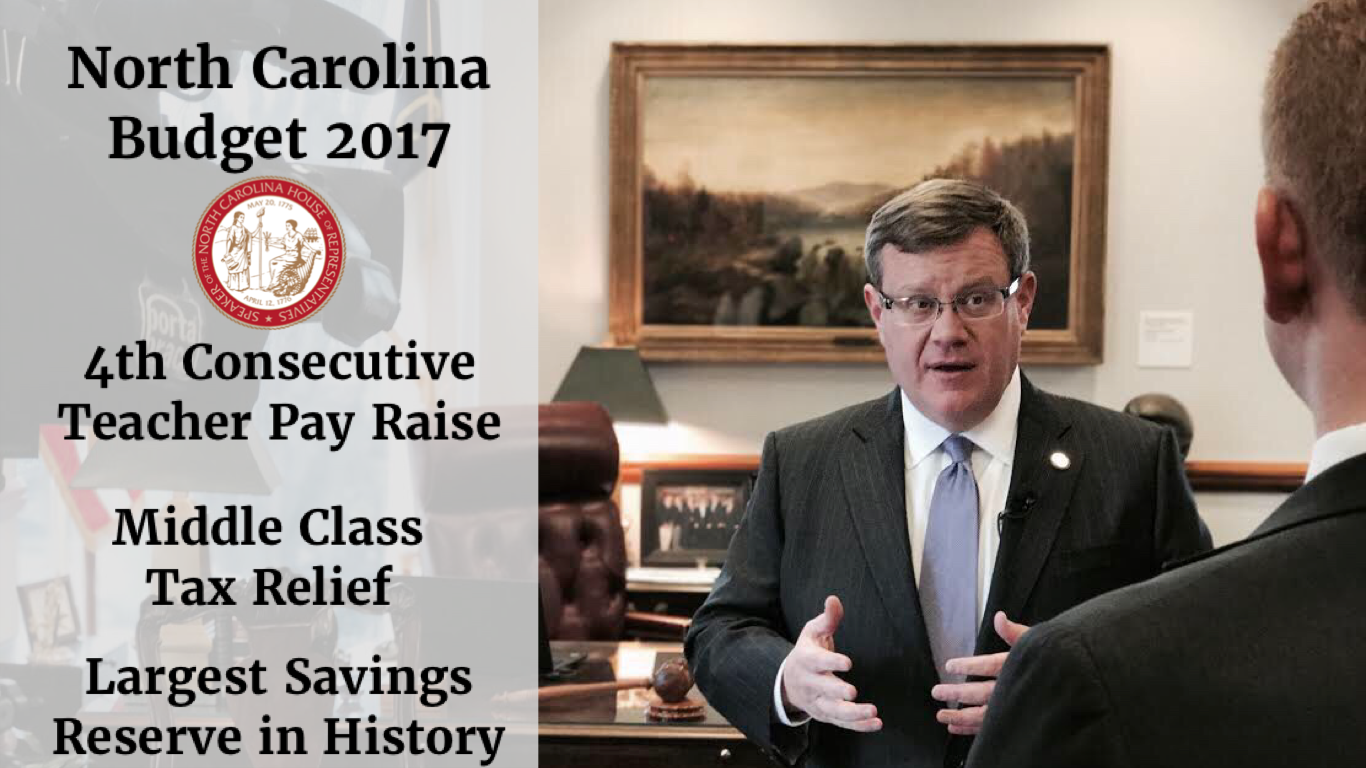Raleigh, N.C. – House Speaker Tim Moore (R-Cleveland) joined Senate Leader Phil Berger (R-Rockingham) for a joint press conference Monday to announce details of the roughly $23 billion budget and tax relief agreement reached between the state House and Senate.
The budget proposal includes a plan to cut personal income tax rates and raise the standard deduction to add 95,000 North Carolinians to the zero-tax bracket, building on Republicans’ tax relief and reform already provided to North Carolinians since 2011.
As a result, millions of middle-class families and job-creating small businesses will keep more of their earnings under this year’s plan. Budget officials expect 99 percent of taxpayers to either pay less or no state personal income taxes at all under the 2017 tax relief plan.
“Gov. Cooper will sign this budget if he cares about increasing the zero-tax bracket for low-income North Carolinians, keeping a long-term commitment to increasing teacher pay, providing disaster relief to hurricane-hit regions and protecting the state from future emergencies through smart savings and responsible spending.”
The Republican-led General Assembly has generated hundreds of millions of dollars in budget surpluses – and billions in savings reserves – through tax relief, balanced budgeting and economic growth since 2011.
Last decade, North Carolinians were dealt teacher pay cuts and billions in budget deficits despite Democrats’ raising sales tax rates in 2003, 2005, 2007 and 2009.
2017 Budget Details
Additional key provisions of the budget include:
In Salaries and Benefits –
- Keeps the plan to dramatically increase average teacher pay from last year’s budget, investing more than $100 million in the first year alone. This is in addition to the substantial teacher pay raises legislators passed in 2014, 2015 and 2016.
- Incorporates a new plan to let highly-qualified new teachers begin at a higher pay grade on the salary schedule, providing financial incentive to those who accept positions in low-performing schools, are licensed in special education or STEM classes or meet other criteria.
- Includes roughly $25 million to expand a performance-based bonus program to top-performing 4th and 5th grade reading teachers and 4th-8th grade math teachers, based on EVAAS growth scores.
- Allocates $10 million over two years for a bonus program for veteran teachers with more than 25 years of experience.
- Provides more than $35 million to substantially increase principal and assistant principal pay, including funds for performance bonuses for principals.
- Includes $10 million in additional compensation for community college employees.
- Provides a $1,000 salary increase to state employees.
- Offers experienced-based step increases to teachers, State Highway Patrol troopers, clerks and magistrates.
- Provides $10 million in the biennium toward hard-to-hire positions across state government, such as health care technicians and nurses.
- Designates roughly $4 million to allow Gov. Cooper to increase the base salary ranges for many state workers.
In Education –
- Increases funding for public education by nearly $700 million over two years.
- Fully funds K-12, community college and public university enrollment growth.
- Allocates more than $100 million from lottery funds over the biennium for grants to economically struggling, rural counties to assist with critical public school building needs.
- Invests an additional $11 million in textbooks and digital resources and increases funding for children with disabilities.
- Codifies the legislature’s intent to use data it is currently gathering from local school systems in accordance with state law to fund a new salary allotment for kindergarten through fifth grade program enhancement (music, arts, physical education) teachers beginning in the 2018-2019 school year.
- Supports the new N.C. Teaching Fellows Program through the N.C. Education Endowment Fund.
- Restores funding to Eastern North Carolina STEM and extends the “TA to Teacher” pilot program in the 14 local school districts originally designated for expansion.
- Protects the Read to Achieve, Teach for America, and Communities in Schools programs from being cut by the Department of Public Instruction to fund bureaucracy.
- Provides additional assistance to community colleges for workforce training programs.
- Honors the commitment to fully fund the N.C. Promise Program, which guarantees in-state undergraduate students at three schools across the state pay just $500 per semester for tuition.
- Includes over $18 million in new funding for medical education, including funding increases to the UNC School of Medicine and to the school’s Asheville campus.
- Provides additional stabilization funds to Elizabeth City State University to help get the school on solid financial ground.
- Offers $2.5 million each year of the biennium to support doctoral programs at North Carolina A&T University.
- Directs $1.5 million to the Cheatham-White Scholarship Program, which will provide state matching funds for up to 20 scholarships at both North Carolina Central University and North Carolina A&T University, beginning in the 2018 fall semester.
In Health and Human Services –
- Provides more than $27 million over two years to add 3,525 new pre-K slots – eliminating 75 percent of the waitlist for at-risk children.
- Upgrades the Controlled Substance Reporting System that will use advanced analytics to detect and fight prescription drug abuse.
- Allocates $15 million over two years to community health centers, rural health centers, free clinics and other health services providers in rural and underserved areas that assist the uninsured.
- Invests $18 million to improve North Carolina’s child welfare program, including new training and prevention programs, and nearly $4 million to improve accountability and oversight of the system.
- Earmarks close to $3 million to provide support for additional foster children in the system.
- Continues preparing for the transition to Medicaid reform by allocating $75 million to grow the Medicaid Transformation Reserve.
- Includes more than $12 million for 400 new innovation waiver slots for people with intellectual and other related developmental disabilities that are at risk for institutional care.
- Designates $10 million for opioid and substance abuse treatment statewide.
- Allocates $19 million from the sale of the Dorothea Dix property to fund behavioral health beds.
In Justice and Public Safety –
- Begins the process to “raise the age” in North Carolina, ensuring 16- and 17-year olds suspected of misdemeanor offenses and less serious felonies would be tried as juveniles instead of adults by December 2019, and establishes a Juvenile Jurisdiction Advisory Committee to develop specific plans for implementation.
- Strengthens laws against human trafficking and funds signage to increase awareness of the warning signs of trafficking.
- Funds needed additional positions in the state court system, including dozens of new deputy clerks of court and assistant district attorneys.
- Provides more than $4 million for law enforcement training for North Carolina officers.
In Taxes and Economic Development –
- Reduces the tax burden on North Carolina families and small businesses by cutting the personal income tax rate from 5.499 to 5.25 percent in 2019, and by increasing the amount of income that is exempt from state income tax.
- Lowers the corporate income tax rate from 3 percent to 2.5 percent in 2019, continuing the business tax reforms that have helped create more than half a million new jobs since Republicans took control of the state legislature in 2011.
- Simplifies and reduces the franchise tax on small businesses by cutting what is effectively a statewide property tax on small businesses and creating a flat $200 tax on the first $1 million of a business’s net worth.
- Provides over $4 million to support tourism advertising as well as domestic and international advertising to promote economic development.
- Allocates close to $4 million for revitalization grants in towns and cities across the state.
In Agriculture and the Environment –
- Increases funding for the Clean Water Management Trust Fund, the Tobacco Trust Fund and the Agricultural Development and Farmland Preservation Trust Fund.
- Expands support for the aquaculture industry and provides funding for dredging to ensure valuable economic activity at the North Carolina coast can continue.
- Allocates over $750,000 to expand international marketing of North Carolina agricultural products.
- Provides funding for engineers to improve dam safety and review emergency action plans to help prevent catastrophic flooding.
- Sets aside $2.3 million to purchase a new firefighting aircraft in the wake of devastating wildfires in Western North Carolina.
- Provides $250,000 to the Department of Agriculture to continue fighting against federal overreach in the form of the new Waters of the United States definition after the Cooper Administration withdrew from the federal lawsuit challenging this unprecedented land grab.
In Transportation –
- Increases funding for the Strategic Transportation Investments Program (STIP) by $320 million over two years, which will allow 100 new highway projects to be added over a ten-year period.
- Includes $241 million to improve structurally deficient bridges across the state, adds $143 million to improve the condition and safety of existing roads, increases contract resurfacing by $20 million and increases funding for pavement preservation by $30 million, extending the life of thousands of miles of roads.
- Invests $100 million to fund immediate need construction projects across the state that improve mobility and safety, reduce congestion and spur economic development.
- Includes $208 million over two years for a Roadside Environmental Fund dedicated to ensuring the safety and beautification of the state’s highways.
- Modernizes the state’s transportation network by providing additional funding to airports across the state for infrastructure improvements, and to the State Ports Authority for infrastructure and dredging needs.
Elsewhere –
- Brings the rainy day fund to $1.838 billion, or 8.2 percent of last year’s budget – the largest dollar amount and percentage in state history.
- Adds $125 million to make needed repairs and renovations to state and university facilities.
- Helps preserve North Carolina’s military operations by allocating $2 million for the next Base Realignment and Closure (BRAC).
- Continues the commitment to improving government transparency by funding a website that makes every state agency, county, and local school district budget available for citizens to view online.
- Aims to make government operations more efficient by investing in a fully-consolidated statewide Enterprise Resource Planning system.
- Helps the office of the State Auditor conduct more specialized audits and allocates funding to assist the state Department of Revenue and Department of Insurance in identifying and preventing fraud.
Work on the full budget agreement is ongoing, and lawmakers hope it will be posted to the North Carolina General Assembly website at www.ncleg.net on Monday night.


